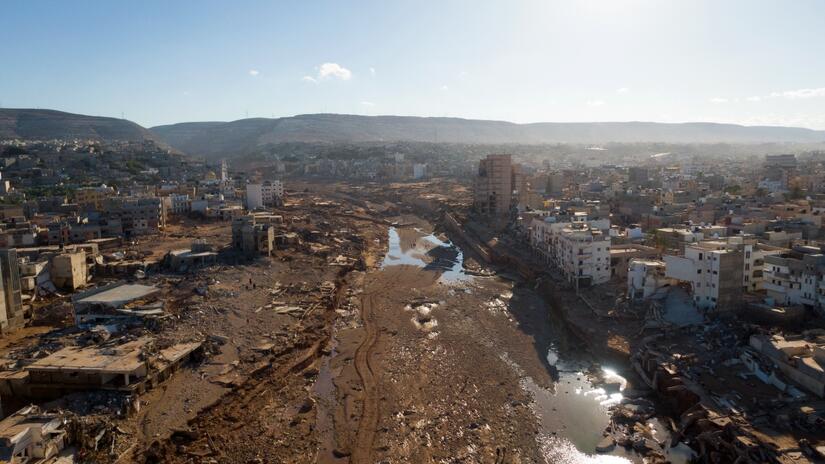Geneva/New York 19 September 2023 - What happened in Derna should be a ‘wake up call for the world’ on the increasing risk of catastrophic floods in a world changed by climate change, says Jagan Chapagain, Secretary General of the International Federation of Red Cross and Red Crescent Societies (IFRC). Chapagain was talking in the light of a report saying climate change made the disaster in Libya significantly more likely.
Rapid analysis by the World Weather Attribution group – a group of scientists supported by the International Federation of Red Cross and Red Crescent Societies - analyzed climate data and computer model simulations to compare the climate as it is today, after about 1.2°C of global warming, with the climate of the past. The scientists found that human caused climate change has made heavy rainfall in north-eastern Libya up to 50 times more likely to occur than it would have been in a world not experiencing human-caused climate change. They also found there was up to 50% more intense rain than there would have been in a comparable rainstorm in a pre-climate change world.
The scientists are clear that, even in a 1.2°C ‘warmed’ world, the rainfall that fell on Libya was extreme. It was an event that would only be expected to occur once every 300-600 years. Even so, that frequency is much higher than would be the case in a world that had not warmed.
Rainfall alone did not make the Derna disaster inevitable. Enhanced preparedness, less construction in flood-prone regions and better infrastructure management of dams would have reduced the overall impact of Storm Daniel. Nonetheless, climate change was a significant factor in causing and exacerbating the extreme weather event.
Julie Arrighi, Interim Director at the Red Cross Red Crescent Climate Centre which had researchers working on the World Weather Attribution report said:
“This devastating disaster shows how climate change-fuelled extreme weather events are combining with human factors to create even bigger impacts, as more people, assets and infrastructure are exposed and vulnerable to flood risks. However, there are practical solutions that can help us prevent these disasters from becoming routine such as strengthened emergency management, improved impact-based forecasts and warning systems, and infrastructure that is designed for the future climate.”
Jagan Chapagain, Secretary General of the International Federation of Red Cross and Red Crescent Societies said:
“The disaster in Derna is yet another example of what climate change is already doing to our weather. Obviously multiple factors in Libya turned Storm Daniel into a human catastrophe; it wasn’t climate change alone. But climate change did make the storm much more extreme and much more intense and that resulted in the loss of thousands of lives. That should be a wake up call for the world to fulfill the commitment on reducing emissions, to ensure climate adaptation funding and tackle the issues of loss and damage.“
More information:
To request an interview, please contact: [email protected]
In Geneva:
Andrew Thomas: +41763676587
Mrinalini Santhanam: +41 76 381 50 06
Tommaso Della Longa: +41 79 708 43 67





